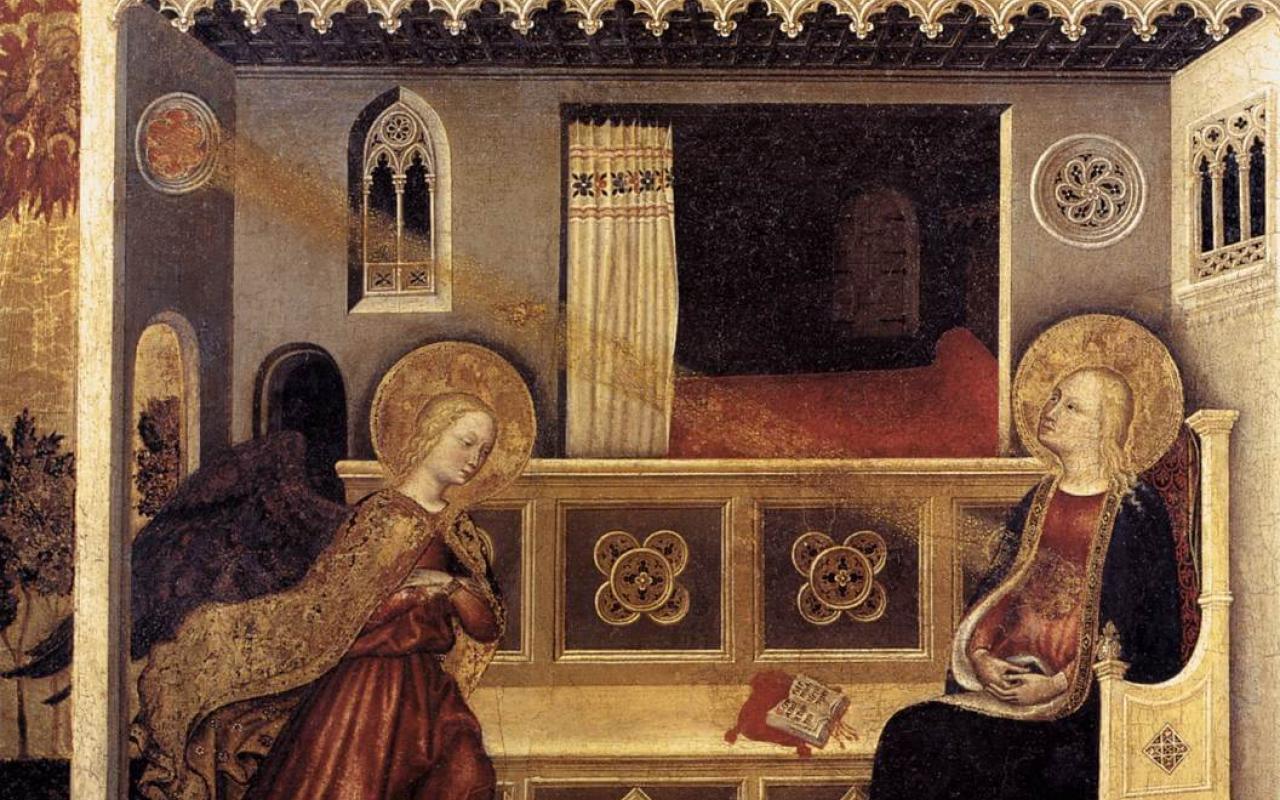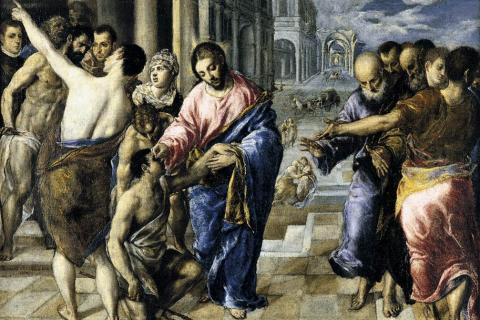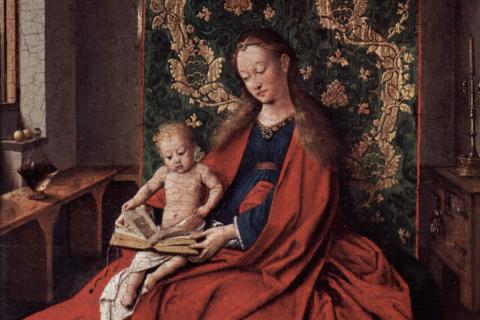
The vocation of the university professor is comprised of two essential elements: stewardship for truth and a responsibility to the souls entrusted to his or her care.
Christians know that every walk of life comes with a vocational dimension. The simplest and humblest tasks can be opportunities to honor God, to bring his presence to others, and to contribute, at least indirectly, to building the Kingdom. For the one called to be a university professor, that vocational dimension is intensified. The professor at a Catholic university is involved in the pursuit and dissemination of truth, and beyond this, the professor is called to care for immortal souls, to help in the formation of minds and spirits after the image of Christ. This means that the professor accepts an important trust, one that bears an explicit apostolic charge. Christian educators are builders of the Kingdom in a direct and momentous way.
The vocational importance of the educator can be seen in the traditional instinct and practice of the Church to entrust education, especially at the highest levels, to individuals or communities explicitly consecrated to the service of God. We need not see in that long practice the only possible arrangement; in fact, given the important mission of the laity in witnessing to Christ in a society structured like ours, it may not even be the best arrangement. Nevertheless, it underlines for us the nature of the educator’s task as an apostolic charge. Those who take up university teaching, whether lay or consecrated, should be aware that they have chosen more than a profession or career path that can be pursued according to the logic of professional advancement and personal development alone. They have signed onto a mission and embraced a high calling, a calling that brings with it a specific set of loyalties and responsibilities.
This essay is an attempt to describe the heart of the Christian professor’s vocation, an especially urgent task in our day when university teaching has taken its place beside other secular professions, and when universities, including many Catholic universities, are having difficulty remembering the true nature of their intellectual apostolate. What is discussed here is not meant to be an exhaustive account of the professorial vocation nor the final word on how that vocation should be lived. Its aims are more limited. It hopes to bring to the fore certain aspects of the Catholic university’s purpose and the professor’s role in that purpose that are often overlooked, in the hope of sparking further discussion about the nature of this important Christian call.
The Dual Vocation of the Catholic University
There are two aspects of the vocation of the university professor, related but distinct, that are worth examining separately. One is the imperative to seek, guard, and communicate truth; the second is the responsibility to care for the young immortal souls who have been entrusted to the university.1 Putting it this way is not meant as a reformulation of the often-discussed question of teaching versus research or of how the two may rightly be combined in a university setting. Apart from any determination about whether or how much a given institution should be a center of research, these two aspects of the Catholic university or college’s vocation remain paramount.
As to the first of these, the call to honor and pursue truth: In a significant historical development, when early Christianity made its way into the cultures of the ancient world, it came to understand itself not as a further development of that world’s religions (apart of course from the Jewish religion) but as the fulfillment of its philosophical schools. Early Christian apologists and theologians such as Justin Martyr, Origen, and Clement of Alexandria spoke of themselves as philosophers and identified Christianity as the “true philosophy.” Here is how Justin described his conversion, an event that took place around AD 130: "A fire was suddenly kindled in my soul. I fell in love with the prophets and these men who had loved Christ; I reflected on all their words and found that this philosophy alone was true and profitable. That is how and why I became a philosopher. And I wish that everyone felt the same way that I do." The Church Fathers sought to correct whatever errors or imbalances they found in the ancient philosophies, whether Platonic, Stoic, or Aristotelian, but they admired much of what they found there and built upon those insights.
Every student has been made by God for an eternal destiny, and the professor has been given a share in helping others toward that destiny, in however indirect a way.
Under the long tutelage of Christianity and Judaism before it, we have become used to the idea that the practice of religion leads naturally to an understanding of the cosmos and to an ordered moral life. But before Christianity, most of the world’s religions had not been interested in an overall account of truth or in a particular moral posture. They were geared to placating the gods and to invoking and participating in the rhythms of nature, which often involved rites and ecstatic states in which rational thinking was purposely set aside. In contrast to this, the Greek philosophical quest for the logos, for reason, order, rationality, or the word, as it is variously translated, was an attempt to master the whole of reality in all its interlocking parts. Socrates was accused by his opponents of being an atheist, but he was not at all an irreligious thinker. He was interested in the whole of reality, natural and supernatural, and he found the contemporary myths of the gods to be either silly or immoral. Interestingly, the same accusation of atheism was lodged against early Christians, and for many of the same reasons. Christians had little use for pagan myths and the worship of the gods and either attacked or ignored the religions of their time. But the philosophic quest for truth, the desire to grasp hold of all that was real, was incorporated even into the Christian scriptures, where the second person of the Trinity through whom the world was created bore the name of “reason.” The heart of the Christian religion is thus an account of reality. “For this I was born, and for this I have come into the world, to bear witness to the truth. Everyone who is of the truth hears my voice” (John 18:37). When Jesus spoke these words to Pilate at his trial, Pilate responded, perhaps cynically, with a rhetorical question that could stand for much of the modern secular university’s quandary: “What is truth?”
The Christian embrace of the Greek philosophical tradition, a pattern that had already been underway among the Jews, was a momentous event in the history of world religions.2 For our purposes it is important to note that it had this consequence: that anyone who was attempting to be a devout Christian would by necessity be pursuing the totality of what was real. Christianity meant not just the performance of certain rites or sacrifices, nor the pursuit of ecstatic consciousness-altering states, nor even merely the adherence to a given moral stance; it meant the embrace of the whole truth about God and creation. The “renewal of the mind” (Romans 12:1) was the goal of every Christian, even of those who were not formally educated. It was at the heart of what it meant to be converted to Christ.
This renewal of the mind by the embrace of truth in its multiform expressions, incumbent upon all Christians by virtue of their faith, was ever the special hallmark of the university, the Christian institution where that pursuit finds its most complete and intensive expression. The Catholic university is thus interested in everything, in all that exists, in the whole of reality, not simply as disjointed collections of information but as aspects of a cosmos, facets of a united whole that can be sought and grasped by the human mind and spirit: the being and nature of God, the visible and the invisible worlds, humans in their individuality and in their social relations, ethics and the moral life, and the way all these interrelate in the formation of the human mind and will. When Harvard University took as its motto "Veritas Christo et Ecclesiae," and Yale, similarly, "Lux et Veritas," they were pointing to this fundamental charge of the Christian university. Truth – reality – is the measure of the university’s task, the end to which it constantly returns. If the university loses its grasp on reality, it fails in its purpose and becomes either useless or dangerous to those who inhabit it.3
There are two aspects of the vocation of the university professor, related but distinct, that are worth examining separately. One is the imperative to seek, guard, and communicate truth. The other is the responsibility to care for the young immortal souls who have been entrusted to the university.
"If you continue in my word, you are truly my disciples, and you will know the truth, and the truth will make you free" (John 8:31-2). These words of Jesus point to yet another reason why the call to truth is so important, and they lead us to the second aspect of the Catholic professor’s vocation. According to the Christian account of things, knowledge of the truth and the determination to live by that knowledge sets the human spirit free. Truth is what we were created for, and possession of the truth will save us. For Christians, truth is not just an assemblage of facts about the world. Truth is embodied in a person, and it is ultimately gained through knowledge of that person: Jesus said of himself, “I am the way, the truth, and the life” (John 14:6). Because so much is at stake for each individual in this question of truth, the call to pursue truth also involves the care of those who are seeking that same reality. To be stewards of truth for others demands charity as a motivating principle – the loving concern to see others gain the truth and so be set free. This charity becomes especially important for those serving the young, who are still in the process of laying the foundations of their minds and characters and are therefore uniquely open to truth with all its demands and possibilities, but who are also more vulnerable to malformations that can make the embrace of truth difficult.
In light of the university’s vocational task, it is not surprising that early universities were largely put into the hands of religious communities whose pattern of life provided, first, the practical freeing up of time and energy for the contemplation of truth (a pattern that had already been established in the ancient world, as for example in Plato’s Academy and in the Lyceum of Aristotle), and second, an explicit commitment to charity in the care of the young. As modern universities have lost the sense of their true vocation, the position of the university professor has increasingly come to be seen simply as a job choice, a path for career advancement whose qualifications have little to do with the inner disposition of the professor toward love of truth and love of students. Hence the intellectual and moral crisis faced by modern secular academia is hardly surprising.
1 “It is the honor and responsibility of a Catholic University to consecrate itself without reserve to the cause of truth” (Ex Corde Ecclesiae, par. 4).
2 Pope Benedict XVI expressed this point in his address to the University of Regensburg in 2006, “Faith, Reason and the University”: “The encounter between the Biblical message and Greek thought did not happen by chance. The vision of Saint Paul, who saw the roads to Asia barred and in a dream saw a Macedonian Man plead with him: ‘Come over to Macedonia and help us!’ (see Acts 16:6-10) – this vision can be interpreted as a ‘distillation’ of the intrinsic necessity of a rapprochement between Biblical faith and Greek inquiry.”
3 Consider this passage from Pope John XXIII’s encyclical Ad Petri Cathedram (1959): “All the evils which poison men and nations and trouble so many hearts have a single cause and a single source: ignorance of the truth – and at times even more than ignorance, a contempt for truth and a reckless rejection of it. Thus arise all manner of errors, which enter the recesses of men’s hearts and the bloodstream of human society as would a plague. These errors turn everything upside down: they menace individuals and society itself” (par. 6)… “How can God, who is truth, approve or tolerate the indifference, neglect, and sloth of those who attach no importance to matters on which our eternal salvation depends; who attach no importance to pursuit and attainment of necessary truths, or to the offering of that proper worship which is owed to God alone?” (par. 18).
This article is the first of a five-part series drawn from The Vocation of the Catholic University Professor, published by the University of Mary (2020).
Further Reading
- St. John Henry Newman, Sermon 5, “Personal Influence, the Means of Propagating the Truth,” in Oxford University Sermons
- Nathan Lefler, Theologizing Friendship: How Amicitia in the Thought of Aelred and Aquinas Inscribes the Scholastic Turn
- Raïssa Maritain, We Have Been Friends Together and Adventures in Grace
- St. Gregory Nazianzen, Oration 43, “In Praise of Basil the Great”

